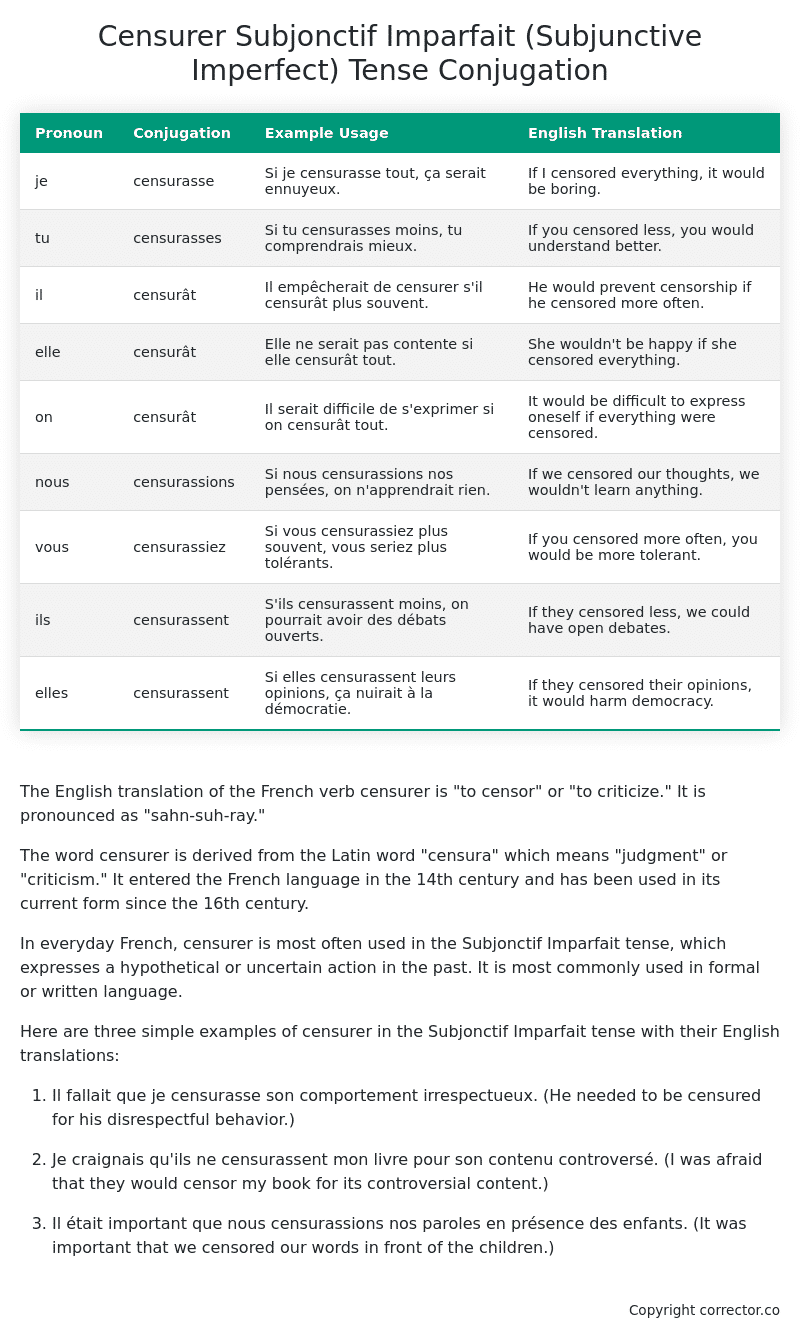Subjonctif Imparfait (Subjunctive Imperfect) Tense Conjugation of the French Verb censurer
Introduction to the verb censurer
The English translation of the French verb censurer is “to censor” or “to criticize.” It is pronounced as “sahn-suh-ray.”
The word censurer is derived from the Latin word “censura” which means “judgment” or “criticism.” It entered the French language in the 14th century and has been used in its current form since the 16th century.
In everyday French, censurer is most often used in the Subjonctif Imparfait tense, which expresses a hypothetical or uncertain action in the past. It is most commonly used in formal or written language.
Here are three simple examples of censurer in the Subjonctif Imparfait tense with their English translations:
-
Il fallait que je censurasse son comportement irrespectueux.
(He needed to be censured for his disrespectful behavior.) -
Je craignais qu’ils ne censurassent mon livre pour son contenu controversé.
(I was afraid that they would censor my book for its controversial content.) -
Il était important que nous censurassions nos paroles en présence des enfants.
(It was important that we censored our words in front of the children.)
Table of the Subjonctif Imparfait (Subjunctive Imperfect) Tense Conjugation of censurer
| Pronoun | Conjugation | Example Usage | English Translation |
|---|---|---|---|
| je | censurasse | Si je censurasse tout, ça serait ennuyeux. | If I censored everything, it would be boring. |
| tu | censurasses | Si tu censurasses moins, tu comprendrais mieux. | If you censored less, you would understand better. |
| il | censurât | Il empêcherait de censurer s’il censurât plus souvent. | He would prevent censorship if he censored more often. |
| elle | censurât | Elle ne serait pas contente si elle censurât tout. | She wouldn’t be happy if she censored everything. |
| on | censurât | Il serait difficile de s’exprimer si on censurât tout. | It would be difficult to express oneself if everything were censored. |
| nous | censurassions | Si nous censurassions nos pensées, on n’apprendrait rien. | If we censored our thoughts, we wouldn’t learn anything. |
| vous | censurassiez | Si vous censurassiez plus souvent, vous seriez plus tolérants. | If you censored more often, you would be more tolerant. |
| ils | censurassent | S’ils censurassent moins, on pourrait avoir des débats ouverts. | If they censored less, we could have open debates. |
| elles | censurassent | Si elles censurassent leurs opinions, ça nuirait à la démocratie. | If they censored their opinions, it would harm democracy. |
Other Conjugations for Censurer.
Le Present (Present Tense) Conjugation of the French Verb censurer
Imparfait (Imperfect) Tense Conjugation of the French Verb censurer
Passé Simple (Simple Past) Tense Conjugation of the French Verb censurer
Passé Composé (Present Perfect) Tense Conjugation of the French Verb censurer
Futur Simple (Simple Future) Tense Conjugation of the French Verb censurer
Futur Proche (Near Future) Tense Conjugation of the French Verb censurer
Plus-que-parfait (Pluperfect) Tense Conjugation of the French Verb censurer
Passé Antérieur (Past Anterior) Tense Conjugation of the French Verb censurer
Futur Antérieur (Future Anterior) Tense Conjugation of the French Verb censurer
Subjonctif Présent (Subjunctive Present) Tense Conjugation of the French Verb censurer
Subjonctif Passé (Subjunctive Past) Tense Conjugation of the French Verb censurer
Subjonctif Imparfait (Subjunctive Imperfect) Tense Conjugation of the French Verb censurer (this article)
Subjonctif Plus-que-parfait (Subjunctive Pluperfect) Tense Conjugation of the French Verb censurer
Conditionnel Présent (Conditional Present) Tense Conjugation of the French Verb censurer
Conditionnel Passé (Conditional Past) Tense Conjugation of the French Verb censurer
L’impératif Présent (Imperative Present) Tense Conjugation of the French Verb censurer
L’infinitif Présent (Infinitive Present) Tense Conjugation of the French Verb censurer
Struggling with French verbs or the language in general? Why not use our free French Grammar Checker – no registration required!
Get a FREE Download Study Sheet of this Conjugation 🔥
Simply right click the image below, click “save image” and get your free reference for the censurer Subjonctif Imparfait tense conjugation!

Censurer – About the French Subjonctif Imparfait (Subjunctive Imperfect) Tense
Formation
Common Everyday Usage Patterns
Interactions with Other Tenses
Subjonctif Présent
Indicatif Passé Composé
Conditional
Conditional Perfect
Summary
I hope you enjoyed this article on the verb censurer. Still in a learning mood? Check out another TOTALLY random French verb conjugation!


